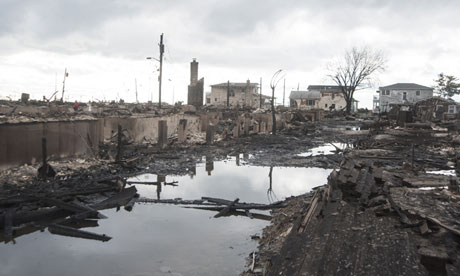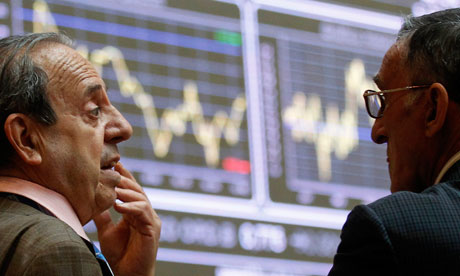Less than three days after Sandy made landfall on the east coast of the
United States, Iain Murray of the Competitive Enterprise Institute blamed New Yorkers' resistance to Big Box stores for the misery they were about to endure.
Writing on Forbes.com, he explained that the city's refusal to embrace Walmart will likely make the recovery much harder: "Mom-and-pop stores simply can't do what big stores can in these circumstances," he wrote. He also warned that if the pace of reconstruction turned out to be sluggish (as it so often is) then "pro-union rules such as the Davis-Bacon Act" would be to blame, a reference to the statute that requires workers on public works projects to be paid not the minimum wage, but the prevailing wage in the region.
The same day, Frank Rapoport, a lawyer representing several billion-dollar construction and real estate contractors, jumped in to suggest that many of those public works projects shouldn't be public at all. Instead, cash-strapped governments should turn to public private partnerships, known as "P3s" in the US. That means roads, bridges and tunnels being rebuilt by private companies, which, for instance, could install tolls and keep the profits. These deals aren't legal in
New York or New Jersey, but Rapoport believes that can change. "There were some bridges that were washed out in New Jersey that need structural replacement, and it's going to be very expensive," he told the Nation. "And so the government may well not have the money to build it the right way. And that's when you turn to a P3."
The prize for shameless disaster capitalism, however, surely goes to rightwing economist Russell S Sobel, writing in a New York Times online forum. Sobel suggested that, in hard-hit areas, Federal Emergency Management Agency (Fema) should create "free-trade zones – in which all normal regulations, licensing and taxes [are] suspended". This corporate free-for-all would, apparently, "better provide the goods and services victims need".
Yes, that's right: this catastrophe, very likely created by climate change – a crisis born of the colossal regulatory failure to prevent corporations from treating the atmosphere as their open sewer – is just one more opportunity for further deregulation. And the fact that this storm has demonstrated that poor and working-class people are far more vulnerable to the climate crisis shows that this is clearly the right moment to strip those people of what few labour protections they have left, as well as to privatise the meagre public services available to them. Most of all, when faced with an extraordinarily costly crisis born of corporate greed, hand out tax holidays to corporations.
The flurry of attempts to use Sandy's destructive power as a cash grab is just the latest chapter in the very long story I have called the The Shock Doctrine. And it is but the tiniest glimpse into the ways large corporations are seeking to reap enormous profits from climate chaos.
One example: between 2008 and 2010, at least 261 patents were filed or issued relating to "climate-ready" crops – seeds supposedly able to withstand extreme conditions such as droughts and floods; of these patents close to 80% were controlled by just six agribusiness giants, including Monsanto and Syngenta. With history as our teacher, we know that small farmers will go into debt trying to buy these new miracle seeds, and that many will lose their land.
In November 2010, the Economist ran a climate change cover story that provides a useful (if harrowing) blueprint for how climate change could serve as the pretext for the last great land grab, a final colonial clearing of the forests, farms and coastlines by a handful of multinationals. The editors explain that droughts and heat stress are such a threat to farmers that only big players can survive the turmoil, and that "abandoning the farm may be the way many farmers choose to adapt". They had the same message for fisherfolk occupying valuable ocean-front lands: wouldn't it be so much safer, given rising seas and all, if they joined their fellow farmers in the urban slums? "Protecting a single port city from floods is easier than protecting a similar population spread out along a coastline of fishing villages."
But, you might wonder, isn't there a joblessness problem in most of these cities? Nothing a little "reform of labour markets" and free trade can't fix. Besides, cities, they explain, have "social strategies, formal or informal". I'm pretty sure that means people whose "social strategies" used to involve growing and catching their own food can now cling to life by selling broken pens at intersections, or perhaps by dealing drugs. What the informal social strategy should be when superstorm winds howl through those precarious slums remains unspoken.
For a long time, climate change was treated by environmentalists as a great equaliser, the one issue that affected everyone, rich or poor. They failed to account for the myriad ways by which the super rich would protect themselves from the less savory effects of the economic model that made them so wealthy. In the past six years, we have seen in the US the emergence of private fire fighters, hired by insurance companies to offer a "concierge" service to their wealthier clients, as well as the short-lived "HelpJet" – a charter airline in Florida that offered five-star evacuation services from hurricane zones. Now, post-Sandy, upmarket real estate agents are predicting that back-up power generators will be the new status symbol with the penthouse and mansion set.
For some, it seems, climate change is imagined less as a clear and present danger than as a kind of spa vacation; nothing that the right combination of bespoke services and well-curated accessories can't overcome. That, at least, was the impression left by the Barneys New York's pre-Sandy sale – which offered deals on sencha green tea, backgammon sets and $500 throw blankets so its high-end customers could "settle in with style".
So we know how the shock doctors are readying to exploit the climate crisis, and we know from the past how that story ends. But here is the real question: could this crisis present a different kind of opportunity, one that disperses power into the hands of the many rather than consolidating it the hands of the few; one that radically expands the commons, rather than auctions it off in pieces? In short, could Sandy be the beginning of A People's Shock?
I think it can. As I outlined
last year, there are changes we can make that actually have a chance of getting our emissions down to the level science demands. These include re-localising our economies (so we are going to need those farmers where they are); vastly expanding and reimagining the public sphere to not just hold back the next storm but to prevent even worse disruptions in the future; regulating the hell out of corporations and reducing their poisonous political power; and reinventing economics so it no longer defines success as the endless expansion of consumption.
Just as the Great Depression and the second world war launched movements that claimed as their proud legacies social safety nets across the industrialised world, so climate change can be a historic occasion to usher in the next great wave of progressive change. Moreover, none of the anti-democratic trickery I described in
The Shock Doctrine is necessary to advance this agenda. Far from seizing on the climate crisis to push through unpopular policies, our task is to seize upon it to demand a truly populist agenda.
The reconstruction from Sandy is a great place to start road testing these ideas. Unlike the disaster capitalists who use crisis to end-run democracy, a People's Recovery (as many from the Occupy movement are already demanding) would call for new democratic processes, including neighbourhood assemblies, to decide how hard-hit communities should be rebuilt. The overriding principle must be addressing the twin crises of inequality and climate change at the same time. For starters, that means reconstruction that doesn't just create jobs but jobs that pay a living wage. It means not just more public transit, but energy-efficient, affordable housing along those transit lines. It also means not just more renewable power, but democratic community control over those projects.
But at the same time as we ramp up alternatives, we need to step up the fight against the forces actively making the climate crisis worse. That means standing firm against the continued expansion of the fossil fuel sector into new and high-risk territories, whether through tar sands, fracking, coal exports to China or Arctic drilling. It also means recognising the limits of political pressure and going after the fossil fuel companies directly, as we are doing at
350.org with our "Do The Math" tour. These companies have shown that they are willing to burn five times as much carbon as the most conservative estimates say is compatible with a liveable planet. We've done the maths, and we simply can't let them.
Either this crisis will become an opportunity for an evolutionary leap, a holistic readjustment of our relationship with the natural world. Or it will become an opportunity for the biggest disaster capitalism free-for-all in human history, leaving the world even more brutally cleaved between winners and losers.
When I wrote
The Shock Doctrine, I was documenting crimes of the past. The good news is that this is a crime in progress; it is still within our power to stop it. Let's make sure that, this time, the good guys win.





